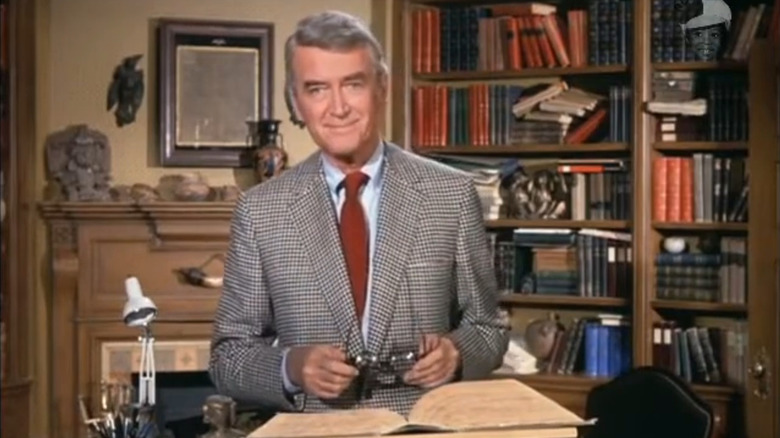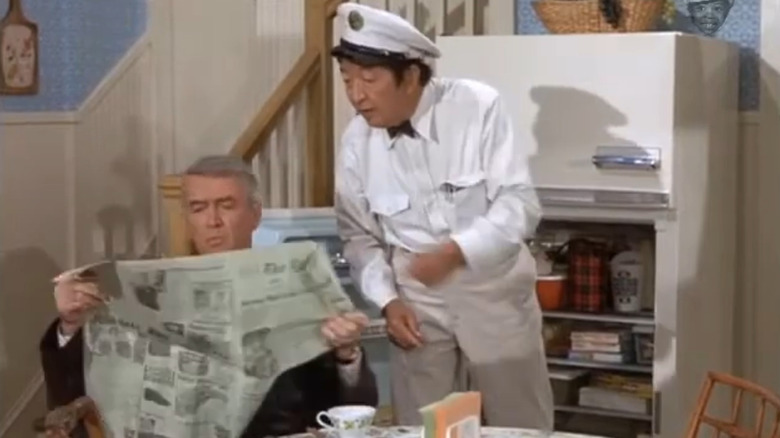This Failed '70s Series Was Jimmy Stewart's Biggest Attempt At Television Stardom
James "Jimmy" Stewart was one of the most successful movie stars of his generation, best known today for his lead roles in many of Alfred Hitchcock's best movies or perhaps as George Bailey in "It's a Wonderful Life." He was a lovable everyman-type lead, and in 1971 he briefly tried to bring that approachable charm of his into the world of television: in September 1971 the first episode of his sitcom, "The Jimmy Stewart Show," aired on NBC. The reviews were rough.
"'The Jimmy Stewart Show' may succeed because Jimmy Stewart is the star," wrote TV critic Clarence Peterson in the aftermath of the premiere. "But the debut was a half-hour idealization of 'the good old days.' Most of the humor was inadvertent."
Critic Larry Williams at the Memphis-based paper The Commercial Appeal was even harsher, declaring the show "dull, trivial," and criticizing the show for being a waste of Stewart's talents. He wrote, "It is sad to think that two of the finest actors Hollywood has produced, Jimmy Stewart and Henry Fonda — are reduced to 30-minute TV sitcoms which are nothing more than time consumers."
Williams compared the show negatively to "The John Forsythe Show," a '60s sitcom starring another movie star lead who was trying and failing to cash in on the young medium of TV. That show had been called "milksoppy" and "cliché" by critics of the time, and was canceled before it could reach the second season. Williams followed this comparison to its natural conclusion, correctly implying that Stewart's show would itself fail to make it into season 2 unless it seriously shook things up. As he put it, "One [episode] does not a season make, but Jimmy Stewart and producer Hal Kanter will have to improve by a thousand leagues over last night."
Why was Stewart making a TV show anyway?
Although Stewart was thriving in the '50s, his string of critical and box office successes faltered in the '60s. His best film of the era was probably "The Man Who Shot Liberty Valance" in 1962; the movie was a gritty western, one that received mixed reviews but has been viewed more favorably over time. He also starred in "How the West Was Won," an ensemble film that became an instant hit. Still, the hit-to-flop ratio was growing worse, and Stewart was increasingly unlikely to be cast in a project's leading role.
Basically: Stewart was getting old and his film career was slowing down. So 1971 seemed like a good time to follow in the footsteps of previous movie stars like Barbara Stanwyck or Robert Young, both of whom gracefully transitioned into TV with tremendous success.
But while Stanwyck and Young's TV shows ("The Big Valley" and "Father Knows Best") felt fresh when they premiered, Stewart's sitcom came in at least ten years too late. The series was too traditional, too safe, airing at a time when audiences wanted something more daring. Stewart with his conservative political views and his increasingly elderly persona was simply not in tune with the wishes of the younger audience NBC wanted to capture.
"'The Jimmy Stewart Show' ... will definitely not return when the leaves begin changing color," reported the Kansas City Times in March of '72. To rub salt in the wound they added, "The situation comedy has been a big disappointment to the viewers." Stewart would star in the CBS mystery series "Hawkins" a year later, but this show would also be canceled after a single season. Stewart may have been a film legend, but his time on TV was a whole different story.

